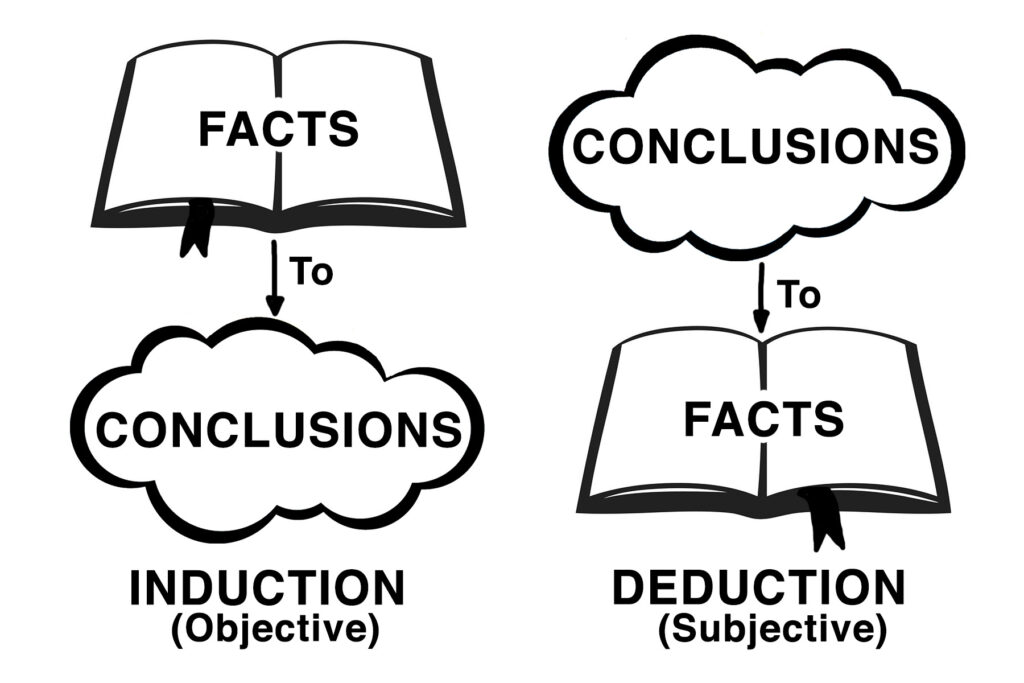Sherlock Holmes was a fascinating character to me as a child and young teen. I would try to solve the mysteries before the book revealed the answers, and I had very discouraging results at first. But Sherlock, man, he could solve a crime. He would see the facts of what had happened (however improbable) and work his way back to the perpetrator.
Did you know that Sherlock Holmes is a champion of the method we use for Bible Study?
The Inductive Method
Inductive Bible study takes that Word of God, as it is, and studies it from there.
We study the Words (terms), Sentences, and Paragraphs to get a feel for what the passage is saying, then draw conclusions.
“Ye shall not add unto the word which I command you, neither shall ye diminish ought from it, that ye may keep the commandments of the Lord your God which I command you.” Deuteronomy 4:2
Three facts about the Inductive Method
- It is scientific in Approach
- Its Process Consists of Analysis
- Its Purpose is to Discover
The Deductive Method
The deductive method is a perfectly legitimate method for Bible Study, but it is only appropriate for certain kinds of studies. It’s common for someone’s personal Bible study plan to switch back and forth between inductive and deductive bible study.
Deductive study has limitations.
“8 For my thoughts are not your thoughts, Neither are your ways my ways, saith the Lord. 9 For as the heavens are higher than the earth, So are my ways higher than your ways, And my thoughts than your thoughts.” Isaiah 55:8–9
By nature deductive study starts with a conclusion and seeks to support that conclusion. This can be a dangerous way to handle God’s word. If we approach scripture strictly through deductive study we risk imposing our assumptions into scripture.
Deductive study is sometimes used for topical, and doctrinal studies. It can be helpful if used carefully. However, deductive study can lead to a tunnel vision where we only see the verse that showed up in our search results without its context. This can lead to a feeling that our conclusions have been validated before we even start the study.
Many have used dissected portions of scripture to support beliefs that are simply not taught in God’s word.
In summary:
The Deductive Method (You speak to the Bible.)
The Inductive Method (The Bible speaks to you.)

How does Inductive Bible Study Work?
Some of the more prominent characteristics of inductive study are seen as follows:
1. It lets the Bible text or passage speak for itself.
We start with the simple question: “What does it say?” This keeps us from trying to force our ideas into the Bible. We can freely learn from the mind of God.
2. It observes first, then it interprets and applies.
When observation is first false results are significantly less likely.
3. It analyzes what the Bible says (content), and how it says it (form or structure).
Context is key. We will look at each word and the structure in which it is used. (Don’t worry, this is simpler than you might think.)
4. It is aware of explicit and implied Truths.
Inductive study will start with the plain text of the Bible, but no-one has studied every deep truth of scripture. Those deep truths are our goal.
5. In it, original, firsthand study holds a prominent place.
You need a firsthand understanding of Scripture. When this is taught as a Bible institute course, all commentaries are restricted at this point. It’s not that those who wrote them don’t have something to teach us. We want to learn from the Bible first.
Your Turn
You can start today!
Begin by reading the book of Philippians. Sit down with just the Bible. Remove other distractions and read Philippians straight through. Then tomorrow read it again.
We’re going to be spending a lot more time in this beloved book, get familiar with it.
